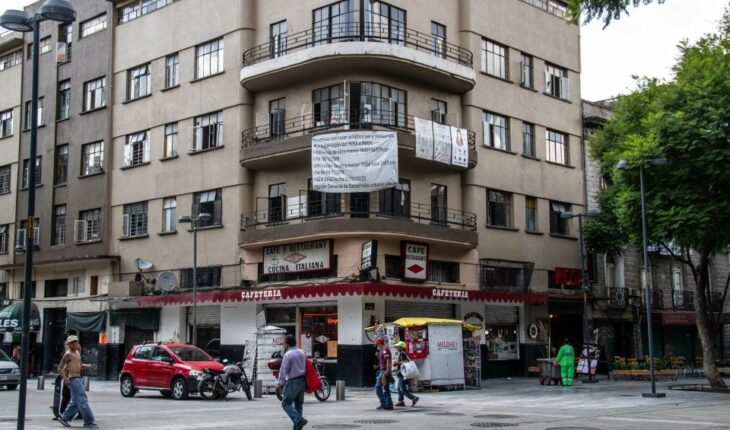“Mexico City is among the 20 favorite destinations of ‘digital nomads.'” This was how the head of the capital government, Claudia Sheinbaum, boasted on Wednesday the agreement that her administration established with the Airbnb platform and the United Nations Educational, Scientific and Cultural Organization (Unesco) to promote the CDMX as a digital tourism center, attractive for foreigners who seek to stay connected to work remotely while traveling the world.
In a public event, Sheinbaum stressed that Airbnb “has the largest audience of travelers on the planet, and this campaign consists precisely of capitalizing on that audience of travelers to position Mexico City as a prominent destination internationally to attract them.” The campaign slogan presents CDMX as “the most connected city in the world”.
But after this announcement, specialists in urbanity and housing issues warn that the boost to short-stay rentals with platforms such as Airbnb will increase rental costs in the capital and could cause the expulsion of tenants in areas attractive to tourism.
In addition, they point out that the lack of measures that accompany the promotion of tourism in areas without adequate and sufficient infrastructure for commercial activity could affect mobility, access to services such as water and even security.
From housing to “de facto hotels”
Carla Escoffié, lawyer and specialist in the subject, is one of the voices that warn about the situation. “It should be clarified that the criticism of the arrival of digital nomads is not being in the tone of asking for measures against these people who arrive in Mexico City, but it is necessary that the authorities recognize that they are causing an urban phenomenon with consequences on the costs of rent, something against which actions would have to be taken to avoid the displacement of the local population by a migratory flow with greater purchasing power, which is not happening,” he says in an interview.
Although Airbnb has tax obligations in Mexico, Escoffié emphasizes that it does not face regulation regarding the limit of spaces that can be rented to tourists. Therefore, it is increasingly common for entire buildings that previously provided accommodation to tenants for extended periods to decide to change their turn to short-term rental, which is more profitable and makes them “de facto hotels”.
“This lack of regulation not only affects those who are expelled from the places they inhabit, but also the owners of the properties and the guests, because the company is not responsible for damages, crimes or frauds that occur within the framework of the platform’s agreements,” adds Escoffié.
For those who are expelled to peripheral areas, he adds, the repercussions impact on their quality of life, with changes in mobility to their workplaces, in the safety of their communities and in the cost of local consumption for those who earn in Mexican pesos.
The specialist emphasizes that the phenomenon of gentrification and touristification of cities is not exclusive to Mexico. This has been documented in cities classified as “tourist capitals”, such as Barcelona, New York and Paris. However, unlike what was announced in the CDMX, in these cities the authorities “have sought and adopted mechanisms to mitigate the effects of the arrival of rental schemes such as those of Airbnb, but here they are not even considering this as a problem, they are romanticizing the lack of protection for tenants and real estate harassment to participate in this speculation “.
Read: Is gentrification the problem?
A “rescue” of the city at the cost of displacement
The intention to “rescue” some areas of the CDMX dates back to the 90s, during the regency of Manuel Camacho Solís, according to the doctor in geography Adrián Hernández Cordero, who has dedicated himself to investigating the processes of gentrification and touristification in the capital.
“Since then, a set of strategic policies have been designed to rescue several areas, including the Historic Center, Alameda Sur and Polanco, thinking that activating these points would generate dynamism and development, with a neoliberal intention of transformation that has been consolidated with the last governments,” he details in an interview.
With the measure announced by Sheinbaum, Hernández warns that there is a risk of social and urban segregation of the city. He affirms that the arrival of Airbnb “will progressively expel those who cannot afford life in these areas of the city, where not only will the price of life increase.e income, but also of basic consumer products, from bakeries and tortilla shops to basic appliances in the corner store.”
“This phenomenon has different implications in the lives of the inhabitants of the city, from the loss of neighborhood references to real estate harassment that will generate impacts on their health, stress and anguish. Sometimes we think of housing as something material, but it also has a symbolic and emotional value, which if lost makes people very emotional, “says the researcher.
For Hernández, it is important to specify that the process that is currently taking place in the CDMX is not gentrification, a phenomenon that implies the change of population of popular sectors by middle class, but of touristification, which occurs when the displacement occurs for the arrival of itinerant neighbors.
According to the academic, this process of touristification has been promoted by UNESCO not only in the CDMX, but globally, with the intention of “generating mobility, especially tourism, which in this case is related to digital attractions”.
The success of selling yourself as a friendly business
Rosalba Loyde, an urban development consultant, explains that there are several platforms for short-term rentals. Airbnb has been more successful than its competition because it promotes itself as a “friendly” business.
“It sells stories like that of an elderly woman who lives alone and who began to rent a space to help her economy, or of those who have earned extra income by using idle spaces in their homes, with an image that there is coexistence of the owner with the guests and a community coexistence, but this is not so. and in many cases the owners do not even live where they rent,” says the professor at UNAM and Tecnológico de Monterrey.
Data from Airbnb shows that, in September 2019, hosts with a single space offered represented 48% of the total subscribed to the platform, and by March 2021 the number dropped to 42%, while there was an increase in hosts offering more than 10 accommodations.
“This shows that short-term rentals are a model to which several owners are migrating, and that there are those who are acquiring properties with the sole purpose of participating in this activity, because they can earn 100% or up to 200% more than they get with traditional rental tenants,” says Loyde.
The head of government said that with the agreement with Airbnb and Unesco the increase in rents for inhabitants of the CDMX is not foreseen. However, the academic explains that, without regulation from the authorities, this is likely to happen, which will further complicate access to housing in central areas that already have a strong real estate tension and will end up expelling and segregating people.
Read: CDMX and Airbnb agree to promote “creative tourism”; Sheinbaum denies raising rental prices
In the case of areas without infrastructure to meet the tourist demand, and that were contemplated by the capital government in the Airbnb agreement – such as Xochimilco and Milpa Alta – the consultant foresees that the difficulties of mobility and access to services such as water will increase, as well as an increase in insecurity because there will no longer be certainty about people entering and leaving homes and there will be no knowledge between Neighbors.
“Tourism makes it difficult to control many issues that require regulations, from land use – which in some places is becoming commercial, although as a rule it must only be residential – to real estate speculation that, having no limit, will take advantage of legal loopholes to benefit in areas of high surplus value,” Loyde alert.
What we do at Animal Político requires professional journalists, teamwork, dialogue with readers and something very important: independence. You can help us keep going. Be part of the team.
Subscribe to Animal Político, receive benefits and support free journalism#YoSoyAnimal





